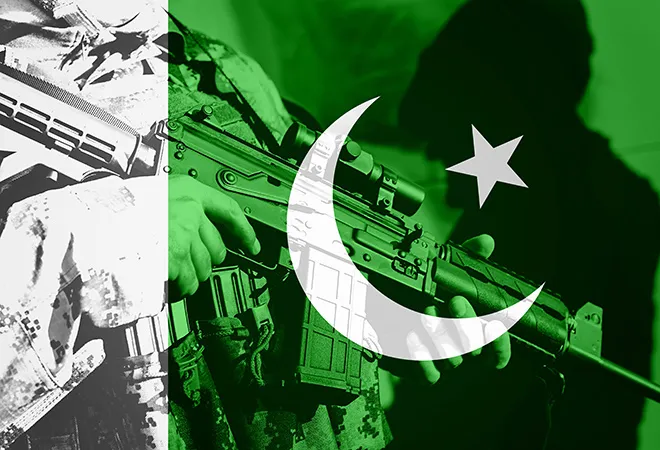
Last week, Imran Khan’s government released Pakistan’s first-ever National Security Policy (NSP), amidst much fanfare and hype. The document declares that the government’s NSP is to focus on economic security of the country and transfer the dividends reaped from a strong economy to measures that help strengthen the country’s defence and human security capabilities. The document discusses the different opportunities and challenges for national cohesion and security, the country’s economic future, defence and territorial integrity, internal security, foreign policy, and human security, while providing policy guidelines for the same. The public version of the document is important to study because while it is rife with inconsistencies and wishful rhetoric, it is cognizant of the fact that things need to change, though remaining confused on the what and, more importantly, the how.
While the NSP refers to India, China, the United States (US), Iran, and the Gulf, the entire document is littered with contradictions regarding Afghanistan, a country where Pakistan has played a significant role in creating the mess it is in today.
While acknowledging that divisive discourse on different identities is a challenge for Pakistan that negatively impacts national cohesion, it ignores the fact that Pakistan has followed a policy of this exact nature of disruptive and divisive meddling in Afghanistan, with the intentional aim to undermine national cohesion.
In Section Three, which looks at national cohesion, the document states that, “divisive discourse around ethnic, religious, and social differences is a concern, exacerbated by disruptive external support that aims to undermine national cohesion and incite disharmony on issues of identity”. While acknowledging that divisive discourse on different identities is a challenge for Pakistan that negatively impacts national cohesion, it ignores the fact that Pakistan has followed a policy of this exact nature of disruptive and divisive meddling in Afghanistan, with the intentional aim to undermine national cohesion. Through its political, diplomatic, and logistical support for the Taliban, Pakistan has worked to ensure that the sensibilities of the rural, conservative Pashtuns are protected and advanced, over other ethnic groups. Minorities such as the Hazaras, who are Shia Muslim, have historically been discriminated against and targeted by the Taliban, with tactical support from Pakistan. This policy has, in fact, been the opposite of what India’s policy towards Afghanistan was in the mid-1990s, as New Delhi chose to support the Northern Alliance, which was a multi-ethnic coalition of Taliban-opposed leaders and groups.
When discussing the opportunities and challenges that trade, investment, and connectivity provide in securing the country’s economic future, the policy document discusses how “westward connectivity is a significant driver for Pakistan’s push for peace and stability in Afghanistan”. This is partially true that Pakistan requires westward connectivity for access to Central Asia through Afghanistan; however, its so-called “push for peace” was rather a “push to get the US out”, so that the Taliban could provide them with said access. The document also states in the same section that westward connectivity is “ever more important given that eastward connectivity is held hostage to India’s regressive approach.” There are numerous such instances throughout the document where Pakistan continues to believe that it is the ‘victim’ or the ‘sole fatality’ of foreign policies of other nations. If this NSP was truly an attempt to look inward, reflect, and realise on what opportunities and challenges Pakistan as a nation has missed over the last seven decades, it has failed, because it continues to believe that India is “out to get it” or rather, India’s policies are solely directed at Pakistan. In reality, Pakistan’s eastward connectivity is not, in the slightest, held hostage by India or any other nation. It is free to trade, invest, or connect with whatever nation is chooses to do. It shares a strong bilateral relationship with a number of states in South Asia, including Sri Lanka, Bangladesh, and Nepal, with economic ties between them steadily expanding. The primary issue regarding South Asia connectivity has never been India, which, at the center of the subcontinent, has been only encouraging of greater connectivity between its neighbours, but rather the use of cross-border terrorism by Pakistan to achieve its warped foreign policy objectives. It is highly unfortunate that Pakistan has failed to understand that India has never tried to influence other South Asian nations to not trade or build its economic relationship with Pakistan. It is Pakistan that has failed to look beyond India and realise that the only thing that is holding it back is its own policies.
The primary issue regarding South Asia connectivity has never been India, which, at the center of the subcontinent, has been only encouraging of greater connectivity between its neighbours, but rather the use of cross-border terrorism by Pakistan to achieve its warped foreign policy objectives.
“War on terrorism”
The document has also devoted a section to internal security of the nation, where it discusses terrorism stating that, “Pakistan pursues a policy of zero tolerance for any groups involved in terrorist activities on its soil”. While such a declaration is, of course, false, given that Pakistan is home to several indigenous terrorist organisations, it reveals Pakistan’s age-old policy of believing that some terrorist groups are good, or can be coopted for the supposed ‘greater good’. The same section goes on to state that, “Pakistan has fought one of the most successful wars against terrorism in the past decades.” Such an argument is, once again, untrue. In fact, Pakistan’s so-called war against terrorism must be considered as one of the most unsuccessful campaigns ever launched. Post September 2001, under tremendous pressure from the US, Islamabad chose to publicly side with Washington D.C. to battle the Taliban and Al-Qaeda. By no stretch of the imagination has that war been won or successful, given that today, the Taliban is in power in Kabul once again and Al-Qaeda remains thriving under their patronage, not only in Afghanistan but the larger region as well. As for domestic battles the Pakistan Army may have waged against other military groups, the Tehrik-e-Taliban Pakistan (TTP) remains active despite whatever military campaigns the Pakistan Army may have run against it in the past. The Afghan Taliban shows no indications that it is against the TTP or that it will prevent it from carrying out attacks in Pakistan. Given that every province of the country is home to a series of militant outfits and extremist organisations, it is deceitful, dishonest, and devious of the Pakistani establishment to continue to lie and mislead its citizens about its no tolerance policy for terrorist activities.
Pakistan’s so-called war against terrorism must be considered as one of the most unsuccessful campaigns ever launched. Post September 2001, under tremendous pressure from the US, Islamabad chose to publicly side with Washington D.C. to battle the Taliban and Al-Qaeda.
Pakistan’s National Security Policy might be its first, but there is nothing new, innovative, or unique about it. It continues to place blame on others, without being reflective and inward-looking as it should have been. The sudden emphasis on economic security will not ensure all other forms of traditional security will be successful, given that the unbalanced civil-military relationship in the country is what has caused the steady economic decline in Pakistan in the first place. As a political document to appeal to the voters of the Pakistan Tehreek-e-Insaf (PTI) party, the National Security Policy is a success, as it gives the people what they want: The belief that their leaders realise that something needs to change. However, as a serious policy document, it is overwhelmingly delusional and still believes that Pakistan has been held back by others and that now things will be different. The unfortunate truth is, it won’t be any different.
The views expressed above belong to the author(s). ORF research and analyses now available on Telegram! Click here to access our curated content — blogs, longforms and interviews.



 Last week, Imran Khan’s government released Pakistan’s first-ever National Security Policy (NSP), amidst much fanfare and hype. The document declares that the government’s NSP is to focus on economic security of the country and transfer the dividends reaped from a strong economy to measures that help strengthen the country’s defence and human security capabilities. The document discusses the different opportunities and challenges for national cohesion and security, the country’s economic future, defence and territorial integrity, internal security, foreign policy, and human security, while providing policy guidelines for the same. The public version of the document is important to study because while it is rife with inconsistencies and wishful rhetoric, it is cognizant of the fact that things need to change, though remaining confused on the what and, more importantly, the how.
While the NSP refers to India, China, the United States (US), Iran, and the Gulf, the entire document is littered with contradictions regarding Afghanistan, a country where Pakistan has played a significant role in creating the mess it is in today.
Last week, Imran Khan’s government released Pakistan’s first-ever National Security Policy (NSP), amidst much fanfare and hype. The document declares that the government’s NSP is to focus on economic security of the country and transfer the dividends reaped from a strong economy to measures that help strengthen the country’s defence and human security capabilities. The document discusses the different opportunities and challenges for national cohesion and security, the country’s economic future, defence and territorial integrity, internal security, foreign policy, and human security, while providing policy guidelines for the same. The public version of the document is important to study because while it is rife with inconsistencies and wishful rhetoric, it is cognizant of the fact that things need to change, though remaining confused on the what and, more importantly, the how.
While the NSP refers to India, China, the United States (US), Iran, and the Gulf, the entire document is littered with contradictions regarding Afghanistan, a country where Pakistan has played a significant role in creating the mess it is in today.
 PREV
PREV


